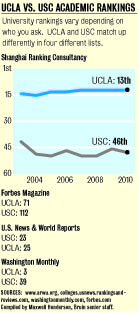
There is one ranking which trumps the combined influence of every Top 25 poll: U.S. News & World Report’s Best Colleges.
And this year, UCLA fell one spot: from 24th to 25th, tying in a three-way tie with the University of Virginia and Wake Forest University.
It’s undeniable that our public image is in some way shaped by this poll, with every past, present and future Bruin judged when this ranking comes out.
Which Bruin, when applying to colleges, wasn’t at least aware that UCLA ranked near the top in some poll, somewhere?
But after understanding exactly how U.S. News & World Report compiled its list, the report loses some of its allure. UCLA’s drop in rank is not something to fret about.
While in high school, when I was deciding where to apply, UC Berkeley and UCLA were my top two choices ““ something having to do with their being “good” academic institutions.
Having grown up with two UC Berkeley alumni as parents, this notion was reinforced on a yearly basis by my parents, who would brag about how their alma mater was once again in the U.S. News & World Report’s top 35 universities.
Although students from all but 24 universities would be envious of UCLA’s position, this year’s ranking was seen as a step backward by many.
While the university fell only one spot, the real sting came from the school that managed to leapfrog us: USC.
But should we care about the ranking? Not really.
“The UCs are still holding their own against other publics, even though compared to some of the privates there was a slight downshift. Certainly the budget cuts are starting to have an impact,” said Robert Morse, the man who has been in charge of the U.S. News & World Report’s Best Colleges rankings since the late 1980s.
To understand why UCLA slipped this year, we have to understand the criteria used to rank each school.
“We establish some variables and measures that we believe are indicators of academic quality,” Morse said.
He said that many aspects go into the ranking: graduation rate, academic reputation, freshman retention, faculty resources, student selectivity, financial resources and the alumni giving rate are all given a numerical score, with each category making up a percentage of the school’s overall score.
Only two of these categories had their weight in the overall ranking adjusted from last year: graduation rate and academic reputation.
Each school’s graduation rate received 2.5 percent of the weight previously given to the school’s academic reputation as determined by rankings from other schools and high school counselors.
It makes sense that the increased importance of graduation rates might adversely affect any public school’s ranking.
Larger class sizes mean less of a chance to get help from a professor for struggling students, and with long waitlists of hopeful junior college transfers lining up to take their spots, there isn’t much of an incentive for public universities to spend resources keeping the students they already have.
UCLA was also hurt in the financial resources department this year, as the state of California dramatically cut funding for the entire UC system.
That said, I don’t think UCLA students should just lie down next time a Trojan comes bragging that USC is a more prestigious school.
UCLA still has a lower acceptance rate: We accept 22 percent of applicants in comparison to USC’s 24 percent.
And even though graduation rates tend to favor private schools, UCLA has a higher graduation rate than USC.
But a university’s ranking depends largely on what list it is being ranked on. U.S. News & World Report also publishes a list for the world’s best universities, which has different criteria than its national list.
On this list, UCLA’s ranking shifts dramatically. UCLA is No. 32, just behind Brown University but ahead of UC Berkeley and others. USC veers far behind at No. 112, just behind the University of Helsinki in Finland.
But pointing to the world university list is just falling into the same trap of using rankings to determine which school is better.
“You can do rankings and choose different variables and come up with different results, so people have to be wary of rankings,” Morse said.
It’s natural that whenever there is a competition, people are curious to know who is No. 1 on the list, securing a position worthy to brag about.
While UCLA still isn’t No. 1 in the national rankings, maybe it’s time that Bruins begin to dismiss these rankings for what they really are: simply rankings.
_Do college “rankings” ultimately matter? E-mail Bell at
cbell@media.ucla.edu. Send general comments to viewpoint@media.ucla.edu._
